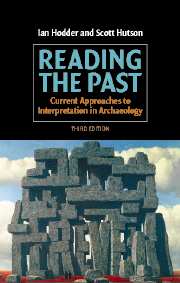Book contents
- Frontmatter
- Contents
- Preface to the first edition
- Preface to the second edition
- Preface to the third edition
- 1 The problem
- 2 Processual and systems approaches
- 3 Structuralist, post-structuralist and semiotic archaeologies
- 4 Marxism and ideology
- 5 Agency and practice
- 6 Embodied archaeology
- 7 Archaeology and history
- 8 Contextual archaeology
- 9 Post-processual archaeology
- 10 Conclusion : archaeology as archaeology
- Bibliography
- Index
2 - Processual and systems approaches
Published online by Cambridge University Press: 05 June 2012
- Frontmatter
- Contents
- Preface to the first edition
- Preface to the second edition
- Preface to the third edition
- 1 The problem
- 2 Processual and systems approaches
- 3 Structuralist, post-structuralist and semiotic archaeologies
- 4 Marxism and ideology
- 5 Agency and practice
- 6 Embodied archaeology
- 7 Archaeology and history
- 8 Contextual archaeology
- 9 Post-processual archaeology
- 10 Conclusion : archaeology as archaeology
- Bibliography
- Index
Summary
In chapter 1 the question was posed: how do we infer cultural meanings in material remains from the past? In this and the following chapters various approaches to achieving this end will be discussed. The search is for an approach that takes adequate account of agency in an historical and cultural context.
It is necessary first to make a distinction between two broad classes of approach followed by archaeologists, which we shall term materialist and idealist. We shall see later that these terms have numerous senses within different schools of thought; for the moment we wish to give them provisional but precise meanings.
For Kohl (1981, p. 89) materialism ‘accords greater causal weight to a society's behaviour than to its thoughts, reflections, or justifications for its behaviour’. This kind of materialism is considered ‘vulgar’ because thoughts, reflections and justifications – the ‘superstructure’ – are said to be wholly determined by the productive economic behaviour that forms the ‘base’ of society. In the materialist scheme, productive capacity and behaviour is influenced only by technology and environmental limitations (see chapter 4 for other forms of materialism). This definition needs to be extended to include the nature of inference within materialist approaches. In this book we mean by materialist approaches those that infer cultural meanings from the relationships between people and their environment. Within such a framework the ideas in people's minds can be predicted from their economy, technology, social and material production.
Information
- Type
- Chapter
- Information
- Reading the PastCurrent Approaches to Interpretation in Archaeology, pp. 20 - 44Publisher: Cambridge University PressPrint publication year: 2003
